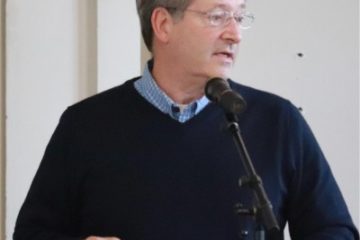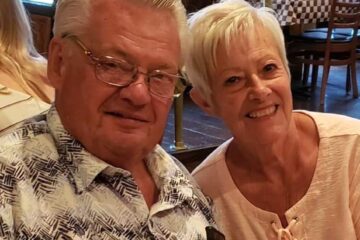Men of Value Interview: Doug Florence by Kevin S. Spivey

In my very first business class in college and my first reading assignment in that class, I came across a principle that truly caught my attention. It is something that has stayed with me for more than thirty years. I read about a study that examined 43 excellently managed companies, such as IBM, Procter & Gamble and McDonald’s. The study concluded that these companies were brilliant on the basics. Rather than having some secret strategy or unique market situation, they simply did the basics very well.
When I pondered that, it made sense to me. As a sports enthusiast I hear all the time that whenever a team is not playing up to their potential, the players and/or coaches seem to always default to, “We’ve got to get back to the basics.” Why do I bring that up here in this article? Because my interview with Doug Florence reminded me of just how valuable that principle can be.
Most of the time when I conduct these Men of Value interviews, I do not know the person I am talking with. I typically start with some ice breaking conversation and lead into some pre-selected questions. From there, the discussion takes a path of its own. In this interview, that is precisely what happened. Nothing out of the ordinary. It was a very smooth and easy flowing conversation.
It wasn’t until I sat down at the computer to begin writing this interview that a realization hit me. I felt refreshed from our conversation. Every interview that I have done for Men of Value has had its own story to tell. Some of them have been deep and philosophical while others have been passionate and descriptive. This one was simple, yet profound.
Doug received his bachelor’s degree in history, but not long after graduating he took the courses to become a paralegal. He took a job in that field and he has been quite satisfied for the past 30 years. I asked him about what kind of things he liked to do. He talked about trips to the zoo, museums, reading, taking walks, and animals-particularly his pet dog Olly and grand dog Dakota. But the piece that brought all of that together was being able to do all of that with his family. His family is number one and they are what brings him the most joy. He talked about how he met his wife Sandy at church, and they got married in 1993. Their daughter Rosalind was born 10 years later. He spoke with great pride about Sandy’s gift of singing and performing and Rosalind’s talents in art and writing.

As I navigated from the conversation to the questions, I noticed a calm, common sense confidence in his voice as he spoke. His responses were succinct and well thought out. I asked him about his values in terms of his faith and family. Doug talked about how God has always been his foundation and guide. He told me that he like to read Psalms and Proverbs for his inspiration and direction for following God’s will. All his decisions-whether about his career, his church, or anything else – come from a place of being spirit led.
Freedom comes with living the life you want as long as it is within God’s boundaries and treating others with respect. When I asked Doug if his faith had ever limited him in his life choices, he paused. He couldn’t think of any limitations. I actually found that lack of response pretty insightful. He could not come up with any situation that he could blame on God. I wished that I could have that response.
The next series of questions I asked were a bit more thought provoking. They were about where we are at as a nation, the problems, the blame, and is there any hope. We all have opinions, some stronger than others, but the core answers are usually close to the same. The decline of the moral compass, divisiveness with our leadership in government, the church, education and business. They all do more talking and less listening. None of the people I have interviewed had lost all hope, but most have felt a sense of a dwindling hope. Some have responded with touches of anger, frustration, desperation and even some philosophies of ingenuity of things that could possibly be done to slow down this dark and deepening spiral.
With Doug, it was a touch of sadness and frustration over the lack of common sense that laced his thoughts of possibility. Doug responded that if the leaders of the churches, government and business could just step up and listen to each other and focus more on our common good and needs rather than chasing after a corrupt and elusive power struggle, we just might be able to start heading in the right direction. His sentiment was, “We can get better.”

He went on to talk about how we can create change is by using our voices in solidarity for the truth and getting back to the things that matter. Teachers should teach, churches should preach, leaders should actually lead. He said that he didn’t recognize our country. But he has hope that there is a generation to follow that has some motivation to help our nation get back on a path leading us to civility, or at least stabilize the unrest. But we as a nation just might have to hit bottom before we can start climbing out of this dark hole.
As a man of faith, Doug has found his path for finding his own truth. He believes that we can all find that path by bringing God back into the picture and returning to His set of moral standings. God doesn’t discriminate because of race or social status. We would all be much better off if we took the time to listen to each other and work on bridging the gap between our differences and respecting each other. Try to accept our different beliefs and find some mutual understanding for the good of everyone. We need to get away from all the toxicity of hatred and terrorism. He quoted Dr. Martin Luther King Jr. from his “I have a dream speech” when he said that he “envisioned a world that a man would be judged not by the color of his skin but by the content of his character.” By the number of events going on in today’s world, we still have a way to go.
The talking points that I use to create these questions can often stir up some intensity and strong opinions, and they should. However, having an impact on changing the course of our nation is for the most part out of our control. What we can control though is our willingness to listen, use words that inspire and influence an authentic path in combination with actions that demonstrate the value of traveling down that path. Such a formula might allow us to be able to lead others to create a unified voice that just may be able to influence more people to synergistically carry the force of energy needed to create the kind of changes that are needed to make our nation, our world, the kind of place it should be.

The time I spend talking with the people I interview typically lasts for about an hour. As I stated earlier, I did not know Doug (or many of the others I have interviewed) prior to the conversation. By the end of our time, I often feel as though I have known the person for an extended period. I have learned something from every interview that I have done, and it is common for me to recognize things that can make me a better person. With Doug, that first college assignment that introduced me to the principle of being brilliant on the basics, came rushing back to my consciousness. It reminded me of the power behind such a principle. The principle came from the class, the demonstration of the power of that principle came from Doug.
We live in a complex and complicated world. It is not a world that is easy to navigate. But does it have to be? What if teachers went back to teaching the rudimentary knowledge and skills that helped build this great nation? What if the churches got back to preaching about God and His moral foundations? What if our businesses got back to producing items and employing people of all classes creating a society of economic balance? What if the politicians and the leaders across all of our nation got back to leading instead of trying to covet all the power and control of everything? What if we all stop blaming each other and do everything that we can to contribute in a way that can bring out the best in each other, you know-all for one and one for all? It all sounds pretty basic to me. So why isn’t it so simple? The easy answer is that we have gotten away from being brilliant on the basics. Do we even know what the basics are in today’s world?


Here are some observations that came from my conversation with Doug. Our pets, mostly cats and dogs (but there are others that can fall into this category) typically eat the same food every day without complaint. They like to play and go for walks. They tend to sleep a lot and go outside (or to the kitty litter box) periodically to do their business. But despite how we deal with them-i.e. being moody, getting angry over a little kitty barf, etc., they seem to always be willing to come running up and greet us followed by some sloppy wet kisses (cats need a little bit more interpretation). They perform in ways that make us laugh and take us away from our troubles so we can relax a bit. After all of that, they tend to curl up with us like nothing else matters except loving us and making us happy. It all sounds like pretty basic stuff to me.
In one of Doug’s most enthusiastic stories he told me about was how he and his daughter Rosalind made a goal of going to 50 zoos before she turned 13. He talked about the importance of conservation and being good stewards of God’s creations. He told me that one of the reasons he enjoyed going to the zoo with his daughter was seeing how the zoo was being a good steward for the animals. Maybe if we each took the approach of being good stewards of our fellow man, we wouldn’t be in a jungle any more. Maybe we could just gather together and enjoy each other’s company. That would make each of us a Man of Value.
By the way, they exceeded their goal of 50!








No Comment